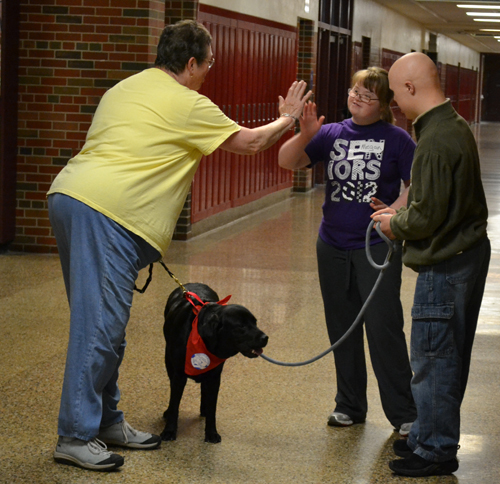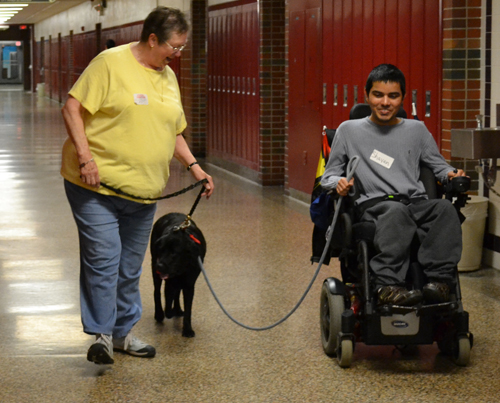
By Tara Cavanaugh
A dog can be a companion, a therapist or even a great teacher.
Just ask the adaptive health class at Pioneer High School, which was visited by Michigan TheraPaws trainers and dogs last month as part of their health and safety curriculum.
The adaptive health class is a new course offered to special needs students. “The philosophy is this is a group of kids that need work on hygiene, taking care of their bodies, dealing with emotions, and extra work on safety and boundaries,” said Janet Baublis, a health teacher at Pioneer. Special education teachers Cassandra Brower, Terry Weaver and Ruben Mauricio helped Baublis create and carry out the course.
Baublis, whose mother and friend are TheraPaws trainers, uses the dogs to reinforce lessons in the classroom. A lesson on personal hygiene was reinforced by learning to keep a dog clean and healthy. And in the most recent TheraPaws visit last week, a lesson on being assertive was reinforced by learning to train dogs and give them commands.

“We’ve been working a lot on being assertive, having a strong body and a strong voice and language– things like how to say no, how to get help,” Baublis said. “So then we thought we’d have the kids give the commands to the dogs, because (the dogs) wouldn’t listen to them unless they were using their strong voice.”
Baublis works with Weaver, Brower and Mauricio to make the students’ lessons fun and memorable.
For the first unit on preventing sickness, the teachers sent the students on a scavenger hunt with a twist: the found objects were covered in glitter.
“They noticed all the glitter would stick to their hands,” Baublis said. “So that’s how we started helping them understand that germs are everywhere.”
To further reinforce the lesson, each class period begins with students properly washing their hands and brushing their teeth. “It’s a lot of rote memory,” she said.
Students are also learning about healthy foods, exercise, managing their emotions and staying safe around strangers.
All the health and safety information is “clicking” with students, said Divina Moro, whose 17-year-old son Nick is in the class.
“He doesn’t often come home with information about school. But in all honesty, this is one class that he’s talked quite a bit about,” Moro said. “He talks about healthy choices, and hygiene practices, and tells us about the dogs that come to visit.”
Moro recently heard her son counting aloud in the bathroom. She discovered he was counting to make sure he washed his hands for a long enough time.
“Which I had already told him to do–or to sing a song,” she said. “Nick has always been a hand washer, but I kind of chuckled and was thrilled that he was doing this for a regulated length of time. He got that from the class. So something’s clicking.”
Moro, a mother of three, adds, “None of these subjects are different than what I would have talked about as a parent. But I think it’s very different coming from being in a class, and it’s not your mommy telling you those things.”
In the future, Baublis would like to add consistent student helpers to the course. For now, general education students are free to drop in on the class and help out. “But I think it would be a cool if they can actually get half a credit and be helpers and establish a good relationship with the kids,” she said. “We have so many kids who either want to go into childcare or education in some way or another. And they love coming down to help.”
Baublis hopes the class will be offered again next year, but for now she isn’t sure if that is possible. “I think these kids need this class for a variety of reasons,” she said. “Especially when we start talking about safety, I think the more people they hear that kind of stuff from, the better.”
Moro agrees. “This population is really at risk for abuse, sexual abuse, bullying,” she said. “So the more information, the more they can have an identity about themselves and their bodies, is always a good thing. Good for them, keeps them safe, makes them more to be able to be a part of the world. I’m very grateful for this class!”
Related stories
- WITH PHOTO SLIDESHOW: Pioneer students earn medals at Special Olympics
- C-SPAN visits Pioneer, gives students awards for film competition
- Beyond Biology: ‘Project Bluebird’ provides lessons in conservation, carpentry
- Navy Band plays to full house at Pioneer High School


2 Trackbacks / Pingbacks